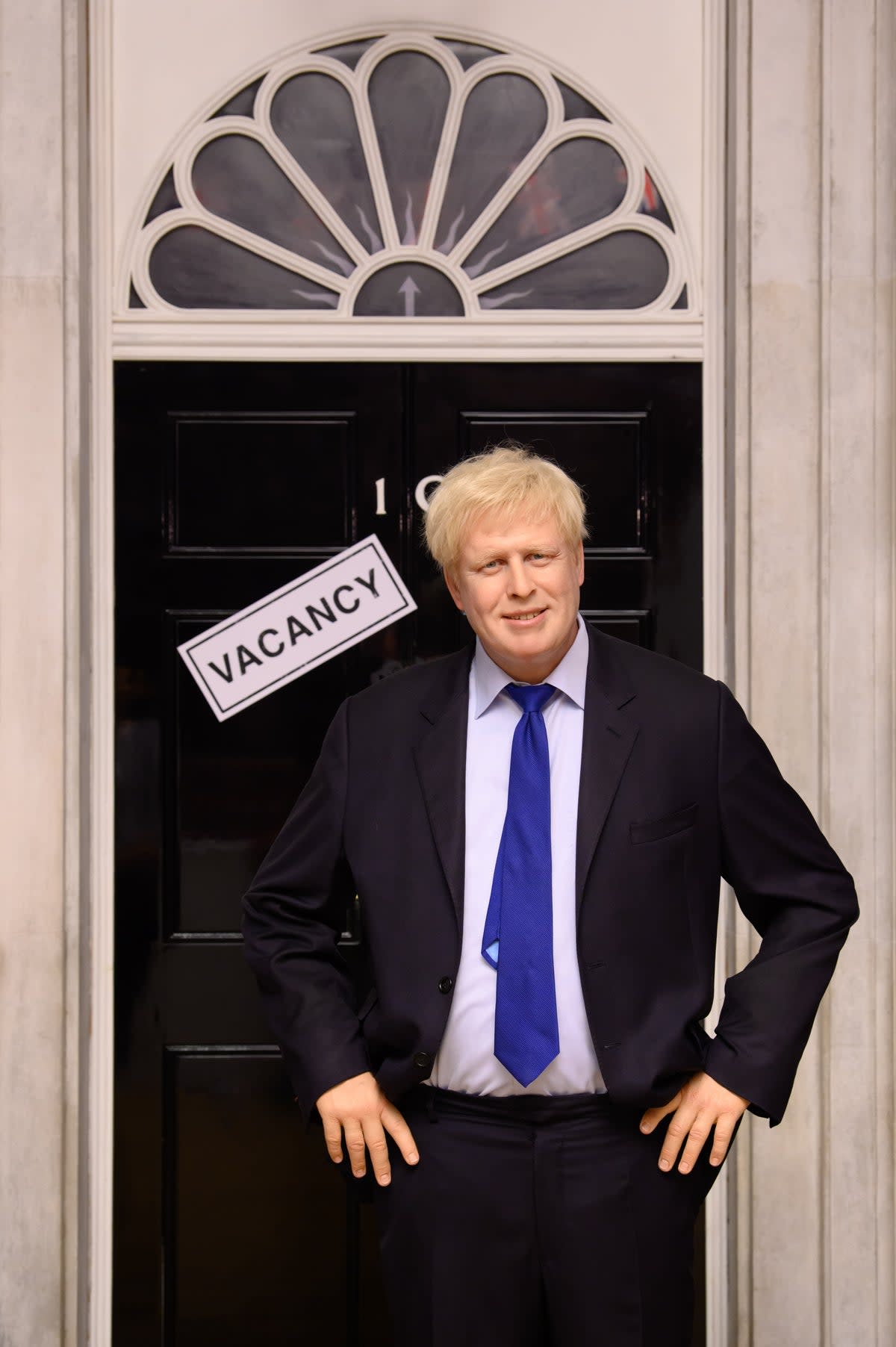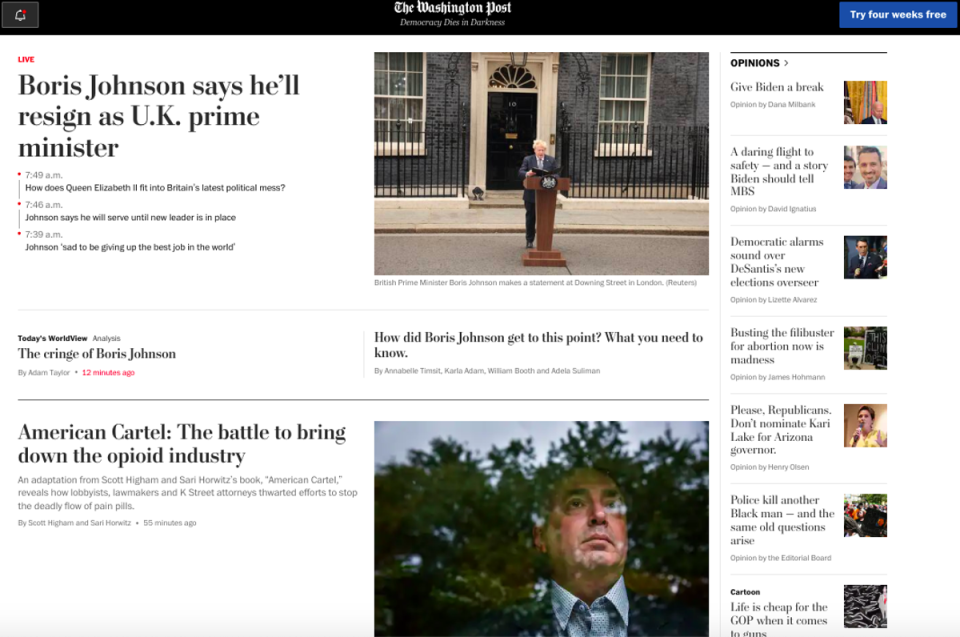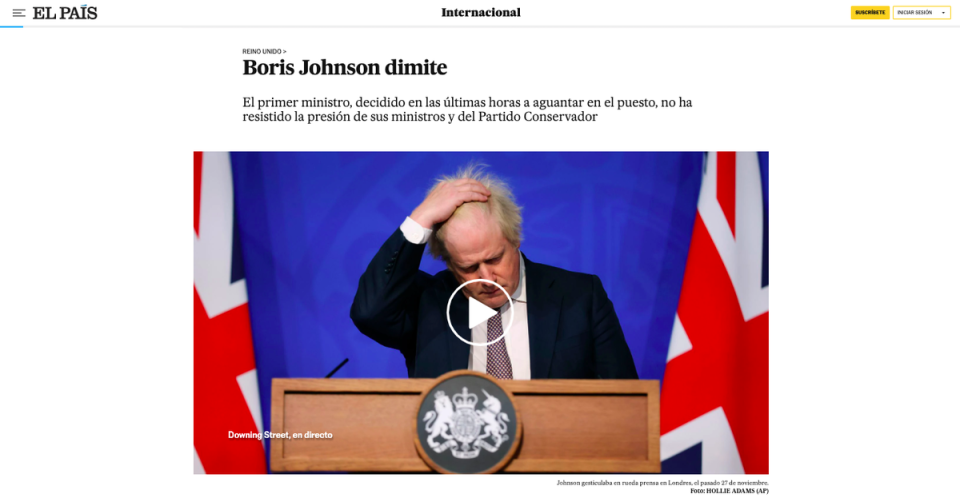What newspapers around the world are saying about Boris Johnson’s resignation

After one of the most tumultuous 48 hours in UK politics, the world watched incredulously as over 50 government ministers and aides resigned from government in an exodus not seen since the 1930s.
The Chris Pincher sexual misconduct scandal was the straw that broke the camel’s back and, via multifarious public statements, MPs claimed they could no longer excuse such unpallatable politics. After a sleepless night for Johnson, where reporters noted his Downing Street flat lights remained on all night, news broke this morning that he had finally decided to resign but would retain his position until the autumn. In his resignation speech, he said he was sad “to be giving up the best job in the world, but them’s the breaks.” Read the full resignation speech here.
In the subsequent hours since the news broke, Madame Tussauds updated its Downing Street display with a large “VACANCY” sign, Larry the Downing Street cat was asked for comment by reporters outside Downing Street and Johnson’s 2010 The Sunday Times article comparing Gordan brown to an “illegal settler” after refusing to leave immediately following his own resignation, trended on social media.
But what is the rest of the world thinking? Here are the main headlines from around the globe.
Le Monde

The French national newspaper has opted for a surprisingly neutral headline as it broke live updates of the situation in Westminster. The lead story outlines the details of the last 24 hours, reporting on the mass resignations and the breaking news that Johnson has finally agreed to resign. The piece ends by focusing on the resignation of UK Northern Ireland Secretary Brandon Lewis, detailing his role in the Brexit debate: “Mr. Lewis leaves the post he has held since early 2020 at a tricky time, with London seeking to change the terms of the deal it signed with Brussels to govern post-Brexit trade in Northern Ireland.”
The Washington Post

The Post’s lead story focuses on the mass resignations by Conservative MPs, with an objective overview of the British political situation. Although its view of the exodus of MPs appears to be less than favourable: “Johnson, who likes to quote Latin and refer to Roman history, faced a growing queue of Brutus impersonators.”
El Pais

The Spanish newspaper has led with a piece about Johnson’s resignation, opening with the line: “Johnson, 58, will submit his resignation to Queen Elizabeth II harassed by the mismanagement of several scandals in the ranks of his party, in which he himself has been involved.”
The Madrid-based paper goes on to give a damning appraisal of the motivations of the Attorney General Suella Braverman, saying: “The woman who prepared for Johnson the convoluted legal reports that justified the unilateral rupture of the Northern Ireland Protocol that pitted London against Brussels; the faithful ally of the prime minister who did not hesitate to praise him at the slightest occasion, announced her (Prime Ministerial) aspirations on the ITV network.”
The New York Times

The New York Times leads with an ironically appropriate image of Boris Johnson waving as he exits Downing Street, in happier bygone times. In a blunt summation of the PM’s final week in office The Times writes that Johnson’s tenure was over after “a wholesale rebellion of his cabinet, a wave of government resignations and a devastating loss of party support, prompted by his handling of the party’s latest sex-and-bullying scandal.”
The New York based newspaper goes on to quote Keir Starmer extensively commenting on Johnson’s departure and his belief that it is long overdue.
Die Zeit

The German broadsheet has been following the Downing Street saga with live updates by a variety of political commentators. In their latest update Boris Johnson’s parting legacy is summarised thus:” Johnson and his government have come under massive criticism over the past few months as a result of a whole series of scandals. In addition to a donation affair, there were scandals about sexual assaults by party colleagues and parties at the seat of government during the corona lockdown.”
The Times of India

The Indian newspaper has run with an arguably more sympathetic line on the Prime Minister focusing on the mass-resignations and his inevitable resignation. The paper outlines his buoyant spirits after his closing statement regarding Russian diplomacy at the NATO summit in Madrid last week, before stating: ââ”This is how he wanted to be portrayed: a powerful world leader who was willing to stand up to bullies and help those most in need.”
Sydney Morning Herald

The fate of Boris Johnson has been documented by the Herald live this morning, with instant updates updating the Australian public about the mass Conservative MP resignations and now the run-up to Johnson’s resignation speech.
Columnist Gwynne Dyer has written a damning opinion piece arguing that the final nail in the PM’s coffin was, “not the economy, or Brexit, or any of his other failures. It was the incessant, instinctive, stupid lies.”
Il Giorno

The Italian newspaper has gone heavy on metaphors to describe the events in UK politics over the last few days, comparing Johnson’s downfall to the sinking of the Titanic.
“For his part, Johnson seems willing to go straight(,) but the iceberg he crashed into - first party-gate in the middle of the Covid pandemic and then the Pincher scandal - now seems to have caused an impossible hole to repair”.

 Yahoo News
Yahoo News 
